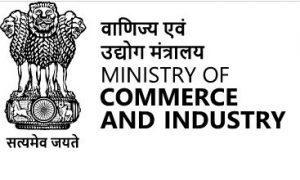Commerce Ministry warns industry against transhipment to US; assures clarity on value addition norms

New Delhi: Commerce Ministry has cautioned the domestic industry to strictly follow the US ‘rules of origin’ norms while exporting goods to America, as re-routing products from high-tariff countries without substantial value addition could be classified as transhipment and attract higher duties, an official said.
The ministry has also assured the industry that all efforts would be made to codify the value addition norms to provide certainty and clarity to exporters, the official said.
The issue was deliberated at length during a stakeholder consultation on India-US trade ties, convened by the ministry May 2 here. The stakeholder consultation was chaired by Special Secretary in the ministry Rajesh Agrawal. He is also India’s chief negotiator for the India-US bilateral trade agreement (BTA).
Transhipment refers to the process of importing products from one country and then exporting to another, usually without significant processing or value addition.
In a meeting with exporters last month, Commerce and Industry Minister Piyush Goyal cautioned domestic exporters that they should not use India as a destination for re-routing goods originating from high-tariff countries like China to the US.
America has imposed 145 per cent tariffs on Chinese goods.
Buying goods from countries facing high US import duty and then sending those to America may invite action from the American authorities which could include blacklisting of firms as such exports violate US rules of origin norms.
The official said that during the consultation, an overview on the ‘rules of origin’ followed by the US was provided.
“It included highlighting different concepts used to determine the origin of goods under trade agreements, product-specific rules in sectors like agriculture, apparels and textiles and automotive. Notably, ‘substantial transformation’ rule for determination of origin was also discussed,” the official said.
US Customs and Border Protection case laws as well as various examples/processes, were discussed to understand what constitutes ‘substantial transformation’ of a product.
“The stakeholders were also cautioned about potential risks associated with classification of India’s exports as transhipment and advised to adhere to non-preferential rules of origin, either fulfilling wholly obtained criteria or meeting the substantial transformation test,” the official added.
Some specific suggestions like the need for codification and quantification of value addition norms were provided by participants to keep ‘substantial transformation’ criteria objective.
Rules of Origin (RoO) determine the true origin of a product when there’s no trade agreement between the US and the exporting country. It is not based on the last country the goods passed through, but on where they were significantly transformed into a new product.
If a product contains a high level of Chinese inputs and doesn’t meet US origin standards, it could still be treated as Chinese and face higher tariffs, even if shipped from India, think tank GTRI said.
Now that the US is applying different tariffs to different countries, these origin rules are the primary test for all imports. Indian exporters must understand and follow them carefully to avoid shipment delays, fines, or tariff shocks, it added.
This is of two main types – preferential and non-preferential RoO. The US Customs and Border Protection (CBP) uses two key tests to determine origin – either the product must be entirely grown, mined, or produced in one country; or it should be substantially transformed.
Under substantial transformation, a product must go through a process in a country that gives it a new name, use, or character. Basic steps like assembling parts, packaging, or labelling are not enough.
“Sometimes it’s hard to tell what counts as substantial transformation. In such cases, CBP makes the final decision. Exporters must be prepared to justify how and where value was added if they want to avoid having their products reclassified, especially as Chinese, and facing high tariffs,” GTRI founder Ajay Srivastava said.
PTI
News